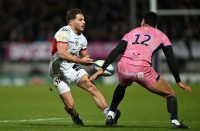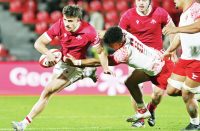 The All Blacks could have played England or Wales in November and charged their going rate for an out-of-window Test of £1m. In refusing both, that left them the option of cashing in at Twickenham at the same time of year without running the risk of their prestige suffering as it did against England last autumn.
The All Blacks could have played England or Wales in November and charged their going rate for an out-of-window Test of £1m. In refusing both, that left them the option of cashing in at Twickenham at the same time of year without running the risk of their prestige suffering as it did against England last autumn.
The Barbarians wanted them for a non-Test at HQ to mark the 40th anniversary of the renowned match in 1973, conveniently overlooking the fact that it was played 150 miles away in Cardiff.
They turned that down, too, in what appeared to be a noble stand for player welfare irrespective of the financial hit. If the champions of the world were not interested in stirring themselves for a seven-figure sum, they were hardly going to play for peanuts, not even when the fixture in question presented them with the chance to repay a large debt.
Fiji invited the All Blacks to do them the honour of sending their team over to Suva to mark the island’s centenary celebrations this year – a worthy cause presenting a belated opportunity to right an historical wrong.
New Zealand have never played a Test match in Fiji, a fact made all the more shameful considering the role native Fijians have played in the All Black cause, among them headline acts like Joe Rokocoko, Joeli Vidiri and Sitiveni Sivivatu.
It wouldn’t have cost them anything and their presence would have brought the island to a standstill. Nobody, of course, makes any real money out of playing in Fiji which is why the RFU, to their discredit, cancelled a trip there in the late Nineties and sent England to greener pastures elsewhere.
The NZRFU declined the Fijian invitation but they did offer to send a band of has-beens under the banner of the All Black Classics or some such title. And then, as if to add insult to Fijian injury, the All Blacks announced that they would be playing an extra Test match in November after all – not at Twickenham, Cardiff or poor old Suva but Tokyo.
It will be their first against Japan since the most hopelessly one-sided New Zealand international of all, when Japan had the misfortune to run into the All Blacks at Bloemfontein during the 1995 World Cup. It turned out to be such a non-Test that the men in the silver fern won by 128 clear points.
The re-match of the ultimate mismatch (145-17) will take place on November 2 as a warm-up for the more demanding engagements over the three ensuing Saturdays against France, England and Ireland.
With their rejection of Fiji all too fresh in the memory, the All Black hierarchy has been at pains to deny their stopover in the Orient has been motivated by the profit margin. According to Steve Tew, chief executive of the NZRFU, the match is “not financially motivated”.
Tew added: “Previous extra Tests such as last year’s clash with England have been played with the host Union paying a generous fee.
“We are going to play in their smaller stadium in Tokyo which only holds about 20,000 people because the big one is not available.”
As a result, he suggests that they will “probably not make money”, a view which will scarcely have gone down well in Fiji. The All Blacks do not go anywhere without good reason.
Steve Hansen, whose contract as head coach has been renewed for two more years, sees it as a “perfect fit into our strategy”, a chance to “grow our game and also grow our leadership and depth within the All Blacks. It gives us a further opportunity to give our younger players further opportunities in the Black jersey”.
They could, of course, have done just that nearer home in Suva but then Fiji is not exactly one of the commercial hothouses of the globe. The All Blacks will no doubt see the lucrative long-term potential to be gained from their missionary visit to a country with a yen for big money.
The multi-national companies running their clubs fork out so much of it that All Blacks are not waiting until the sunset of their Test career, as Mils Muliaina did, before cashing in on contracts which can be worth almost £50,000-a-match.
The Japanese club season runs to only 13 games, easy money compared to the blood and thunder of the French and English leagues.
The danger, from a Kiwi perspective, is that it tends to have a devaluing effect on the once priceless All Black jersey. Recent Japanese imports like Jerome Kaino, Richard Kahui, Isaia Toeava and Anthony Boric are living proof that New Zealand Test players no longer wait for the imminent onset of old age before gilding their pension funds.
One Comment
Leave a Comment
You must be logged in to post a comment.























Question: When did a northern rugby power (France, England, Wales, Ireland) last play a test vs a European team that wasn’t part of the 6 Nations?
Portugal, Romania and Russia have all qualified for Rugby World Cups alongside the Island nations but no mention of their plight or the ignorance of their wealthier, nearby European Unions?
“New Zealand have never played a Test match in Fiji, a fact made all the more shameful considering the role native Fijians have played in the All Black cause, among them headline acts like Joe Rokocoko, Joeli Vidiri and Sitiveni Sivivatu”
If this is the argument — will England consider playing tests in Tonga and Samoa considering the role Manu Tuilagi, Billy Vunipola, Mako Vunipola or Lesley Vainikolo, et al have played? Or likewise Wales in Tonga for Toby Faletau, or France in Fiji for Noa Nakaitaci?
Some perspective with your journalism please.